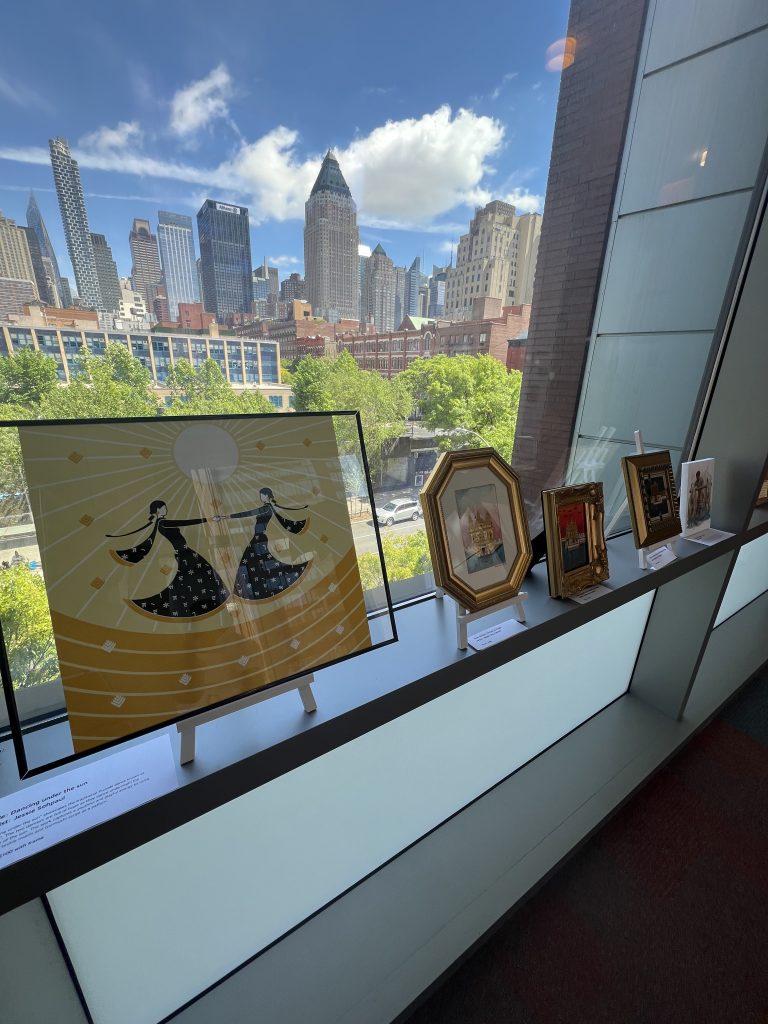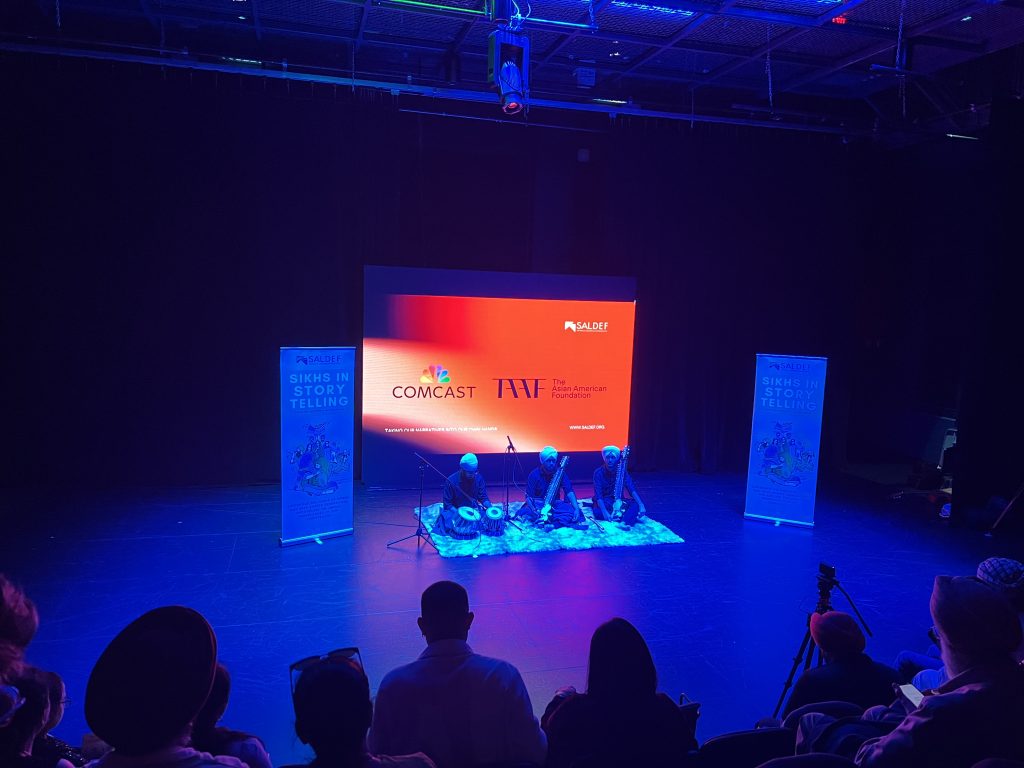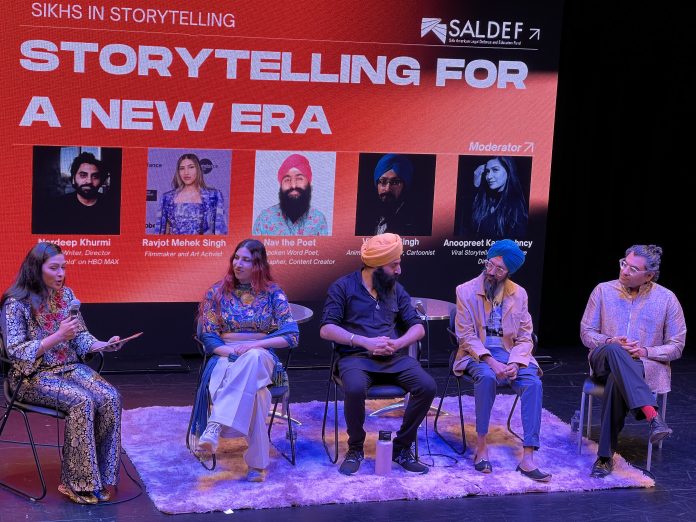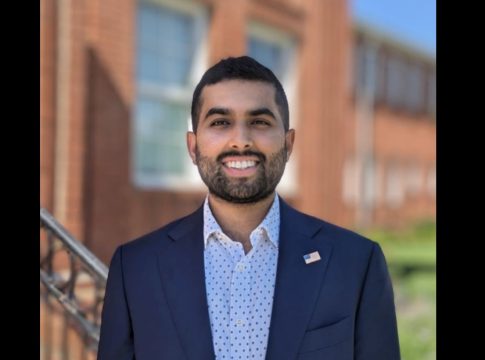by Shree Baphna
The Sikh community has long been known for its distinct practices, rich culture and history of resilience. However, as with any minority community in the United States, stereotypes and ignorance tend to cast a shadow over what being Sikh in America truly means.
On Saturday, May 11th, the Sikh American Legal Defense and Education Fund (SALDEF) organized a community event called Sikhs in Storytelling which took place at the Five Angels Theatre in New York City. A first-of-its-kind event, Sikhs in Storytelling sought to highlight the accomplishments and stories of Sikh American community members who have made leaps and bounds in the activism, arts, and entertainment sectors.
Attendees included Nav the Poet, videographer and content creator; Nardeep Khurmi, actor, writer, and director best known for his film Land of Gold; Ravjot Mehek Singh, filmmaker and art activist; and Anoopreet Kaur Rehncy, storyteller and creative director- amongst many other notable participants.
“People always think that we, as Sikh Americans, will abide by the trope that we can only be doctors, lawyers, or engineers. No- we are so much more than that. We come from a culture and religion that is so rich in the arts. These are people who exemplify that heritage…” stated Amrita Kular, Communications Director for SALDEF.
LATEST STORIES

The storytelling event began with a religious hymn invoking the blessings of the Sikh Gurus and then proceeded to move into panel events with enriching discussions. Simultaneously, artists, vendors, and members of the community mingled outside of the theater. Much of the art on display focused on bringing awareness to the essence of being Sikh and to the duality of being Sikh American. Other pieces depicted the history of the Sikh community and the horrors of the 1984 genocide perpetrated against the Sikh community in India.
“I went viral because I started making accessible content explaining Sikhi and Sikhi customs and symbols,” said Nav the Poet. “People really don’t know the basics about Sikhism- what wearing a pag [turban] means, how it is different and distinct from Hinduism, and so on.”
Other topics of discussion included the plight of Sikh Americans in the immediate aftermath of 9/11 and how many still bear the brunt of the fallout today.
“I think having an event like this is imperative…until we are depicted as real human beings who are nuanced and have depth, we only ever will be tokenized characters. I grew up in a post-9/11 America when I was the only brown person in my small town,” stated panelist Ravjot Mehek Singh.
This was the impetus for her to include Sikhi in her storytelling, Ravjot shared. It was disappointing to see that the only depiction of her people when she was growing up was of men who resembled her dad, with a turban and a beard, who were only ever depicted as savages. Ravjot knew she had to take action and change the way the media and the world saw her community.
Similarly, Vishvajit Singh, animator, filmmaker and cartoonist, recounted his own trying experience after 9/11. He was working in tech at the time and vividly recalled the sheer “heat” he felt being radiated at him from fellow Americans. He decided to work from home for two weeks and when he eventually did step out of his house, Vishvajit recalled how people would flip him off or call him names. It was this experience that informed his career decision to pivot from the engineering and tech world to a more creative media-focused career.
“My goal is not to just inform people about us but to normalize our people doing things that others would not imagine a Sikh person in a turban doing,” Vishvajit Singh said.

Exclusively covering the event was the Boston-based online TV channel Nishkam TV. Also a first of its kind, Nishkam TV is run by students from the Sikh community. It seeks to impart a range of skills to young adults such as script writing, production design, the importance of a social media presence, website management/development, and so on. Above all, it seeks to teach Sikh youth the importance of well-rounded media content told through a Sikhi lens.
Nishkam initially started out in 2016 as an annual film camp. Every year participating students would create short documentaries or films about the different teachings of Sikhism. Nishkam TV was officially launched in 2019, with the main goal of sharing information about different cultures so as to inspire interfaith dialogue.
“It teaches us that we need to take our narrative into our own hands,” a student member of the production team shared. To them, Nishkam TV was a powerful tool and opportunity to insert the Sikh community into mainstream media without giving into the same stereotype over and over. It was an opportunity to inspire a new generation of leading Sikh actors and Sikh directors.
When asked why Nishkam TV focused on students, the volunteers provided a message of hope to future generations to come.
For student team member Tanisha, the importance of informing and educating the future generation is paramount. Seeing as they will be the ones who will eventually take on leadership positions, it is up to them to improve upon what previous generations have done. The idea of Nishkam TV is to start engaging with younger generations earlier on so that they figure out a lot faster what they want to change and how. The youth are not only educated enough to know what is going on in the world but are also equipped to reach out to those younger than them. This is something older generations cannot do as well. By involving young adults as autonomous people and agents of change, there is surely hope that we are one step closer to shaping a more just and inclusive future.
To learn more about the panelists at Sikhs in Storytelling, please click here.
Click here to and here learn more about the critically acclaimed documentaries produced by Nishkam TV.
AsAmNews is published by the non-profit, Asian American Media Inc. Follow us on Facebook, X, Instagram, TikTok and YouTube. Please consider making a tax-deductible donation to support our efforts to produce diverse content about the AAPI communities. We are supported in part by funding provided by the State of California, administered by the California State Library in partnership with the California Department of Social Services and the California Commission on Asian and Pacific Islander American Affairs as part of the Stop the Hate program. To report a hate incident or hate crime and get support, go to CA vs Hate.







